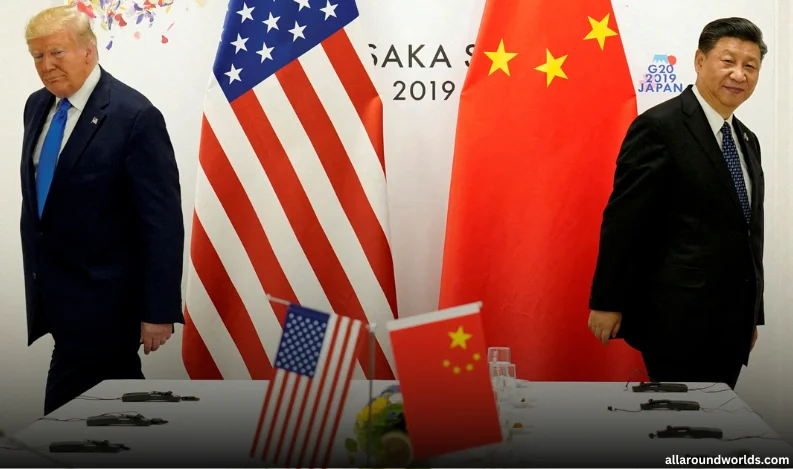
Hollywood Faces Setback as China Retaliates with Film Restrictions Amid U.S. Tariff War
Los Angeles / Shanghai: Hollywood is once again caught in the crosshairs of a U.S.-China trade war. Following President Donald Trump’s decision to escalate tariffs on Chinese imports earlier this week, China responded with sweeping countermeasures—including fresh restrictions on the number of American films allowed in its theaters.
The move has sent ripples through the entertainment industry, compounding an already significant decline in Hollywood's box office dominance in China. Once a golden market for U.S. studios, China has become increasingly self-reliant, producing homegrown blockbusters that have eclipsed the appeal of many foreign imports.
Stocks React as Trade Tensions Escalate
Entertainment stocks were quick to respond to the geopolitical rift. Shares of Disney and Warner Bros. Discovery were both trading lower early Friday as investors processed the potential implications of fewer Hollywood releases in China, one of the world's largest film markets.
The U.S. currently levies a 145% tariff on Chinese goods, with China retaliating at 125%, placing further pressure on American businesses operating across global markets—including film and entertainment.
“The Chinese market has become very challenging for U.S. studios,” said Ann Sarnoff, former CEO and chairwoman of Warner Bros. “Studios once relied on China to bolster global box office returns—but now they often estimate little or nothing from that market when greenlighting new projects.”
A Once-Coveted Market in Retreat
In the early 2010s, Hollywood blockbusters were tailor-made to captivate Chinese audiences, with box office strategies often centered on maximizing Chinese releases. But that era has faded.
Today, Chinese consumers are gravitating toward locally produced films, which now dominate box office charts. The evolution of China’s domestic film industry—powered by advanced technology and national storytelling—has fundamentally shifted audience preferences.
“The growth of China’s own industry has been remarkable,” said Aynne Kokas, professor at the University of Virginia and author of Hollywood Made in China. “China no longer needs Hollywood to fill theaters.”
The expiration of the U.S.-China Film Agreement in 2017, which had previously guaranteed the annual release of 34 American films in China, further constrained Hollywood’s access to the market.
Declining Box Office Returns for U.S. Studios
Hollywood’s diminishing footprint in China is evident in the numbers. In 2019, nine U.S. titles surpassed $100 million at the Chinese box office. Among them, Marvel's “Avengers: Endgame” brought in over $600 million. However, in the last five years, only eight American films have crossed the $100 million mark in China, and only one exceeded $200 million, according to Box Office Mojo.
Meanwhile, China’s domestic titles have soared. The animated sequel “Ne Zha 2” broke records this year, grossing $1 billion in China alone and becoming the first non-Hollywood film to surpass $2 billion globally.
Currency Concerns and Market Volatility Add Pressure
Industry insiders suggest that while the decreased number of U.S. releases in China will slightly impact global box office performance, a more pressing issue is the currency fluctuation. A stronger U.S. dollar lowers international returns when converted back into domestic revenue, hurting bottom lines for U.S.-based studios.
“Studios earn more internationally when the dollar is weak,” noted one senior distribution executive. “But with today’s volatility and tariff unpredictability, projecting foreign earnings has become nearly impossible.”
At the same time, the cost of doing business overseas rises when the dollar is strong—creating a double squeeze for entertainment companies already adjusting to inflation, shifting viewership trends, and the post-pandemic theater recovery.
An Uncertain Road Ahead for Hollywood
The long-term consequences of the ongoing trade war remain unclear. While U.S. studios may explore new international markets or reinvest in domestic growth, the decline of Chinese box office revenues as a dependable source of income will force a reassessment of global distribution strategies.
“Hollywood can’t count on China the way it used to,” Sarnoff concluded. “Studios must now adapt to a new reality—one where foreign policies and nationalist preferences shape where and how films are released.”
As the geopolitical tensions escalate and trade strategies evolve, Hollywood’s path forward will likely be marked by both financial recalibration and creative reinvention.



Recent Comments:
No comments yet.